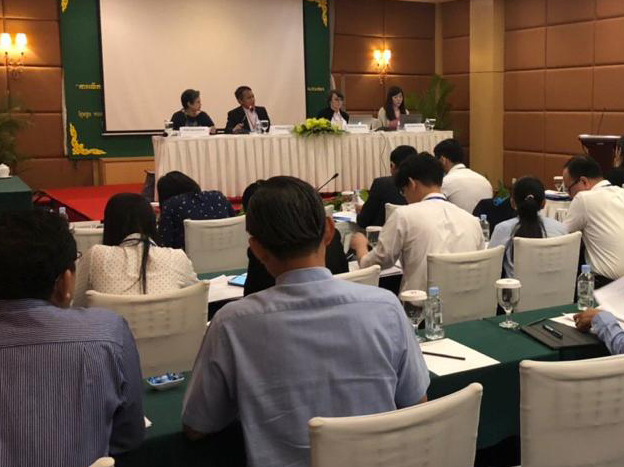Cambodia workshop / Enhancing participation in Codex
To strengthen Cambodia’s capacity for better and more effective participation in Codex work, FAO in collaboration with the General Directorate of CAMCONTROL, Ministry of Commerce organized a training workshop from 18- 20 February 2020. The training is part of a wider five year programme sponsored by Japan which supports capacity building for international food safety standard development and implementation for ASEAN countries.
A total of 40 officials from various sectors including government officials from CAMCONTROL, (the national Codex Contact Point), relevant ministries, and representatives from the food industry, participated in the workshop which was facilitated by FAO experts from Italy and the Philippines, together with FAO officers from the Regional Office for Asia and the Pacific.
As a Codex Member Country, Cambodia seeks to actively participate in Codex activities. Having relevant knowledge is essential, including understanding the structure and function of the Commission and its subsidiary bodies; awareness of Codex rules and procedures, and improving national planning for delegations attending Codex meetings.
We should be well prepared through strengthening technical capacity.
Opening the session, H.E. Pan Sorasak, Minister of Commerce, emphasized the significance of Codex. “We should be well prepared through strengthening technical capacity to be able to increase participation in Codex meetings to ensure quality food for everyone”, he said.
Alexandre Huynh, FAO Representative to Cambodia said: “Better performance and effective participation of Cambodia in the international standard setting process is critical to the success of advocating for its national position, aiming not only to protect the health of consumers in the country but to improve its international market opportunities.”
Hands-on experience: a “mock” session
To strengthen the capacity in Codex participation for government officials and stakeholders of Cambodia, the highlight of the workshop was a mock session, a practical learning process allowing participants to understand how Codex works, how to prepare, present and promote national positions in Codex Committees, and develop negotiation skills through a committee simulation. Follow up via the national Codex focal point will improve channels of communication to keep the smooth flow of information among colleagues and networks.

Simulating a Codex meeting: a practical learning prcess for participants
The fight for food safety in Cambodia
H.E Pan Sorasak emphasized that the availability of and access to safe, quality and nutritious food are key to health and well-being of individuals resulting in increased productivity and economic growth. Therefore, the push for an improvement in innovation, including the support for the establishment of standards of food products and services while enhancing their quality is a priority of the Royal Government of Cambodia (RGC). The RGC recognizes small scale farming is still responsible for food security in the country and so there is a need to ensure a safe and sustainable food value chain.
In line with the policy of the RGC, FAO supports Cambodia to address food safety in different ways. “For food there are two elements: safety and nutrition. We focused our actions on the implementation of good practices for food safety through the chain - from farm to fork - that proved to reduce costs for producers and resulted in higher incomes,” said Alexandre Huynh.
At the country level, FAO has provided technical support to the draft of national food safety law and developed the knowledge-based infrastructure for the implementation and certification of the national Good Agriculture Practice (GAP) standards for fruits and vegetables. FAO introduced and led the application of Participatory Guarantee Systems (PGS) for pesticide-free products, and the development of the street food policy and pesticide labelling guidelines.
Read more
FAO Regional Office for Asia and the Pacific
Categories
- (11)
- (3)
- Animal Feed (8)
- Antimicrobial Resistance (39)
- Antimicrobial Resistance (78)
- CAC46 (15)
- Codex Texts (20)
- Codex Trust Fund (1)
- Codex60 (19)
- Contaminants (13)
- Contaminants (10)
- COVID-19 (64)
- Elections (6)
- Food Safety (126)
- Labelling (10)
- Nutrition and Labelling (5)
- Nutrition and Labelling (7)
- Observers (23)
- Pesticides (7)
- Standards (78)
- World Food Safety Day (154)


